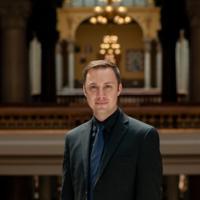Queering Vocal Pedagogy: Affirming Trans and Genderqueer Singers
Thursday 14th March 2024, 5:00 PM - 7:00 PM (London Time)
As a provocative renaming of gay and lesbian studies in the 1990s, “queer theory challenges the normative social ordering of identities and subjectivities” (Brown & Nash, 2016, p. 5). Though queer is used as an identity marker for some LGBTQIA+ persons, as a praxis, queer theory carves space for new perspectives and pedagogies. Annamarie Jagose (1996) explains, “Queer is widely perceived as a calling into question conventional understandings” (p. 97). When used as a verb, 'queering' calls on the re-examining needed to affirm transgender and genderqueer individuals. Thus, queering vocal pedagogy – as a way of querying vocal instruction with an integrated perspective of gender-expansive voices – is an iterative process to make singing instruction wholly welcoming and affirming of all identities.
The intent of queering vocal pedagogy is to maintain a close and critical observation of our traditional practices. Queering is more than inclusivity or a formula of 'best practices'. In music education, Gould (2013) applies queer theory in her discussion of “companion-able species”, where teacher and student, as companions, co-create learning and teaching. Gould inspires queering vocal pedagogy to be an inquiry and interrogation in all domains of vocal teaching – from the socio-ecology of the studio to the technical know-how of singing, from teacher and student rapport to repertoire selection. As a disruption of the status quo, queering our teaching dismantles inequality, invisibility and marginalization in the teaching of singers.
Rooted in a multi-case research project, this session explores the experiences of transgender and genderqueer singers in private voice instruction. Through the lenses of six singers, including a teenage transgender woman, an adult transgender woman, two adult transgender men, and two adult trans/non-binary singers, this session imparts both practical and theoretical knowledge and brings attention to implicit biases that dominate the field of vocal pedagogy. Attendees will garner specific strategies in voice teaching, a greater understanding of affirming gender language, and an overview of the impact of gender in the teaching of singers.
Citations:
Browne, K. & Nash, CJ (2016). Queer methods and methodologies: An introduction. In Browne, K. & Nash, CJ (eds.), Queer methods and methodologies: Intersecting queer theories and social science research (pp. 1-23). Routledge.
Gould, E. (2013). Companion-able species: A queer pedagogy for music education. Bulletin of the Council for Research in Music Education, 197, pp. 63-75.
Jagose, A. (1996). Queer theory: An introduction. New York University Press.
Dr William Sauerland
Dr William Sauerland (he/they) is Assistant Professor of Music and Director of Choral Studies for the School of Music at Purdue University – Fort Wayne, conducting choral ensembles, teaching classes in applied voice and music education, and supervising student teachers.

Attend this course for as little as £22 as part of the Voice Professional Training CPD Award Scheme.
Learn MoreSorry, this is an archived short course...
We have plenty of upcoming short courses coming soon. See details of some of them below or look at the full list of short courses.


Tuesday 3rd March 2026
5:00 PM - 7:00 PM
(London Time)
Sex differences in VOICE!

Dr Richard Lissemore
This two-hour workshop, led by performer, articulatory phoneticist, and voice physiologist, Dr. Richard Lissemore, will examine in detail the role that biological sex plays in the perception and pedagogy of singing voices. We'll consider how parameters such as anatomy, physiology, articulation, resonance, and radiated acoustics influence the perceptions and pedagogical decision-making of singing teachers.

Wednesday 4th March 2026
1:00 PM - 2:00 PM
Wednesday 11th March 2026
1:00 PM - 2:00 PM
Wednesday 18th March 2026
1:00 PM - 2:00 PM
Wednesday 25th March 2026
1:00 PM - 2:00 PM
Wednesday 1st April 2026
1:00 PM - 2:00 PM
Wednesday 8th April 2026
1:00 PM - 2:00 PM
(London Time)
Learn to Coach RP and SSBE – a Certificate in Accent Coaching

Louisa Morgan
This six-week course is an opportunity to learn about both Received Pronunciation and Standard Southern British English. Rather than a course in learning how to speak RP/SSBE (there are many brilliant available courses for this already), this course is about learning how to coach it.

Thursday 5th March 2026
1:00 PM - 2:30 PM
Thursday 12th March 2026
1:00 PM - 2:30 PM
(London Time)
Acting Emotion: Perspectives from the Masters

Louisa Morgan
Stanislavski said, “our artistic emotions are, at first, as shy as wild animals and they hide in the depths of our souls.” Michael Chekhov said, our bodies should be like a “sensitive membrane, a kind of receiver and conveyor of the subtlest images, feelings, emotions and will impulses.” And Meisner said we should be “living truthfully under imaginary circumstances.” Join Louisa Morgan in this 2-part course as she explores a range of well-known acting practitioners to investigate what they believed (or believe) about emotion and how they approached it in their work. She'll compare their work to see where they align and where they diverge.
